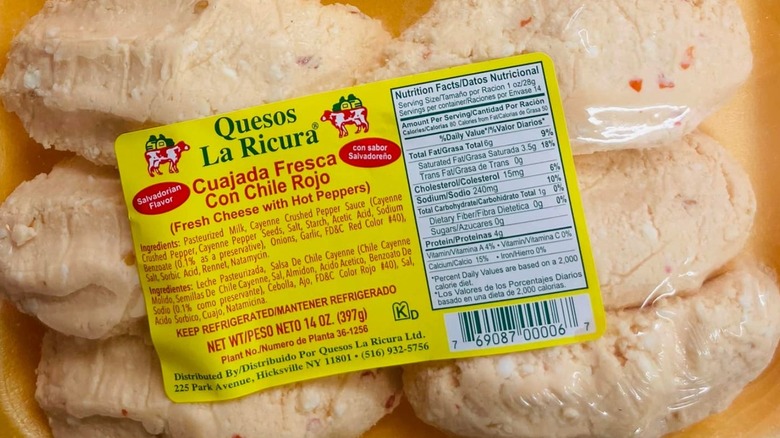Quesos La Ricura Issues Recall For Mi Ranchito Fresh Cheese Over Coliform
Imagine if someone were to come out with a protective face mask that not only acts as a barrier against COVID-19 but also kills the spiky little devils on contact? A new study out of the University of British Columbia suggests that this possibility may not be all that theoretical, per ScienceDaily. In fact, the researchers on that study have already developed a fabric coating that is capable of reducing detectable levels of the novel coronavirus that causes COVID-19 by as much as 90% within two hours. While they were at it, the researchers also discovered this same coating can eliminate 97% of E. coli bacteria in a 30-minute period.
Researchers are still tweaking the formula, but as promising as that may sound, it doesn't address what happens when the exposure to E. Coli is via food. And that's a very real concern at the moment if you've purchased any of the Mi Ranchito brand "Fresh Cheese with Hot Peppers" that manufacturer Quesos La Rincura Ltd. has just recalled due to "elevated levels of coliform," according to Food Safety News. "Coliform," of which E. coli is a species, according to the New York Department of Health, is a type of bacteria that can reside in the digestive tracts of warm-blooded animals. It also occurs in soil, on plants, and in surface water. But there's more to know about Mi Ranchito's Fresh Cheese with Hot Peppers, including where it was distributed and what to do if you think you have some.
Check your fridge and freezer for Mi Ranchito's Fresh Cheese with Hot Peppers
Quesos La Ricura Ltd., a New York State-based dairy company (via LinkedIn) has issued a recall with regard to 2,478 14-ounce packages of Mi Ranchito brand "Fresh Cheese with Hot Peppers" due to "elevated levels of coliform," per Food Safety News. Exposure to coliform in a food product does not mean that it will infect you with E. coli or any other coliform bacteria-induced illness. However, the presence of elevated levels of coliforms raises the specter, which means that consuming the recalled cheese presents a health risk. The units subject to recall were distributed in the following 11 states across the U.S.: Colorado, Connecticut, Florida, Iowa, Louisiana, Maryland, Massachusetts, New Jersey, New York, North Carolina, and Texas. All have a sell-by date of March 20, 2022, and are described by Food Safety News as having a "long shelf life."
The long shelf-life of the recalled product has the manufacturer concerned that people may unknowingly have it in their homes. Therefore, to avoid potential food poisoning, it is important that you check your refrigerator and freezer for units marked with the aforementioned sell-by date. If you find any, you are being "urged" to bring them back to the place where you purchased them.

